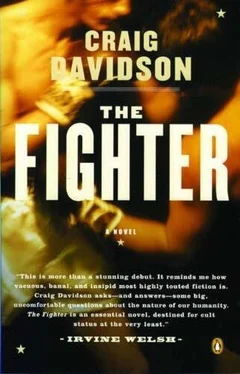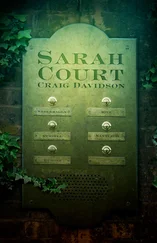“PETA is a little dog with a big bark,” he said. “We’re a little dog with a mouthful of razor blades. We bite ”
Paul was distressed at the mania in Drake’s eyes: skull cored out like a jack-o’-lantern, flickering candlelight dancing behind his eyes. Drake showed him the contents of his shopping bag: boxes and boxes of Eddy matches.
“Do you know,” he said, “that if you stuff a PVC tube with enough permanganate, Sweet’N Low, and match heads, you can blow up just about anything?”
“I didn’t know that,” Paul said. “No.”
Drake caught something in Paul’s demeanor and got agitated. “Know how they skin a fox at a commercial fur ranch? They slit it right here,” his fingers made slashes at his own crotch, “and pull its skin off. It’s alive when they do it. When the skin’s off they chuck the skinless body in a plastic barrel. They don’t even slit its throat. You know what a fox with no skin looks like? A newborn baby. A bloody squirming baby. Picture a barrel full of babies, Paul.”
“I’ve got to get going, Drake. Nice to see you.”
Drake grabbed his wrist. “Hey,” he said softly, “thanks, man. I mean it.”

Now Paul stumbled down a white-walled corridor with hospital beds lining the walls.
He was shivering, having walked fifteen blocks without benefit of a jacket. His teeth hammered and clashed.
The room at the end of the hallway was spare and antiseptic, its lone window inset with steel mesh. Tom Tully lay on the nearest bed. Shirtless, white EKG disks plastered to his shaved chest. The crown of his skull was swaddled in layers of surgical gauze, below which his eyes stared, wide open, at a spot on the wall.
Tom looked so small and frail, so badly — s hrunken. His skin was drawn tight to the bones of his hands, making them appear grotesquely clawlike. Paul pictured a scarecrow with a tear in its belly, straw guts bleeding out in a blustery farmer’s field.
Gummy matter had gathered at the sides of Tom’s eyes. Paul took a Kleenex from a box on the shelf and dabbed at the sticky accretion. Tully’s eyes didn’t blink.
A wave of panic, near-hysteric in scope, washed over Paul. The skin tightened over his head, stretched so taut he was sure it would split to reveal the vein-threaded dome of his skull. He wanted to grab Tully and shake the daylights out of him; wanted to scream WAKE UP! into his sweetly smiling face.
“I’m… sorry,” Paul whispered, his mouth so close to Tully’s head that the downy hairs of his inner ear quivered. “I never saw it happening like this. I never meant to hurt you this way — it wasn’t ever about that.”
A young man came in. He carried an orange cafeteria tray, setting it down.
Seventeen or so: a high school senior, maybe. Not that big, but a strong, compact frame. Dark, short-clipped hair. Eyes the same cornflower blue as Tom Tully’s.
“Who are you?” he asked Paul.
“I’m nobody. Just visiting. Who are—?”
“Robbie. Rob. He’s my uncle.”
“I’m Paul. Were… are you close?”
“He’s my uncle,” Rob said again.
They stood across Tom’s body. An accordionlike breathing bellows rose and fell.
Narcotics dripped through a catheter into his spine.
Rob said, “What are you doing here?”
“I just wanted to see how he was faring.”
“So you’ve seen him.”
Rob’s fists clenched and unclenched; brachial veins pulsed down his biceps. Paul set himself in a defensive stance, figuring the kid might leap across the bed.
“You look like shit.”
Paul picked at the crusted blood on his lips. “It’s been a long night.”
“You crawl out of a Dumpster?”
The kid was goading him — he had every right. Paul picked a condolence card off the bedside table, skimmed it, and set it back.
Rob shifted from left foot to right. Antsy, ready to explode. “Where are you from? I’ve never seen you before.”
“Across the river.”
“You’re a… Canadian? Were you fighting to make ends meet?”
“Would that have been any better?”
“Were you fighting for anyone?”
“I was fighting for someone. Myself.”
Paul pictured the way Tom Tully had fallen: heedlessly, like a trench coat slipping off its hanger to the floor. He pictured Tom Tully with blood coming out his ears and recalled the rush of pure power that flowed through him at the sight; power born of the knowledge he’d reduced another human being to a thoughtless slab of meat, erasing every trace of history and memory and dream. And while he couldn’t quite reconcile the hideous selfishness of these thoughts, neither could he deny he’d harbored them.
“So you didn’t need the money?” Rob asked.
“Money’s never been an issue for me.”
Rob looked at Paul and peeled away the new muscles, bruises, and missing teeth to catch a glimpse of Paul as he’d once been: frail, monied, fearful.
“Can I ask you something?” Paul nodded; Rob went on. “Are you rich?”
“I was never rich. But my parents were.”
“So that, with my uncle… proof of something?”
“I needed to know what I was capable of,” Paul told him. “To know I could walk into a room and know that nobody in that room could… fuck with me, I guess.”
Rob gave a look of such seething hatred it shocked Paul. “I’ve heard spoiled rich kids do a lot of self-centered things, but that takes it.”
He went to the door and shut it. After a brief hesitation he dragged the chair over and lodged it under the doorknob. He crouched on the floor, his posture that of a baseball catcher. For a full minute he sat that way.
“My uncle was a solid fighter,” he said finally. “This shouldn’t have happened.” He raised his head and stared at Paul with those blue eyes of his. “I want to hurt you, Paul. I think… I think I more or less have to. And I think you want to be hurt.”
“We both know a place. How old are you?”
“Old enough.”
“If you think it’ll answer anything. Maybe I owe you.” Paul smiled sadly.
“I don’t want to hurt you.” Then, with perfect honesty: “Or maybe I do.”
Robert Tully dreamed he was in Sharky’s on Pine Street. The bar was dirty and dark and narrow, jammed between an off-license bettor’s and the Pine Street theater, where a roll of dimes bought you a half-hour in the peepshow booths.
The bartender finished polishing a glass and faced Rob and Rob was surprised because the bartender was him, Robert Tully, only twenty years older.
“Heeeey,” Old Rob said, recognizing his younger self. “Look at you, Champ.”
Old Rob was fat in the way a lot of ex-athletes were fat: grossly and awkwardly so, as if after the years of training their bodies ballooned up out of sheer confusion.
He set a glass of soapy draft before his younger self.
“God, it’s good to see you. Me.” He smiled. “Us.”
“I can’t drink this,” Rob said.
Old Rob dumped it down the well. “Not old enough, are you? And still training.
Stupid, stupid me.”
Rob thought something was the matter with his older self: the shambling gait, the slurred speech like a man kicked awake in the middle of the night. And somehow childlike: it was as though his ten-year-old self was trapped in the body of his forty-year-old self.
Old Rob said, “Will you look at our hands.”
Their hands were the same size; evidently, Rob did not have another growth spurt in him. Old Rob ran his finger over a scar running the length of his own left index finger.
“Hey, hey, hey,” he said excitedly, “remember where we got this? South Korea; they flew us over to fight the Asian champ. The water gave us the trots so Dad filled the water bottles with chrysanthemum juice. God, that taste — f lowers. We knocked the champ out but split our finger to the bone. Remember that?”
Читать дальше













